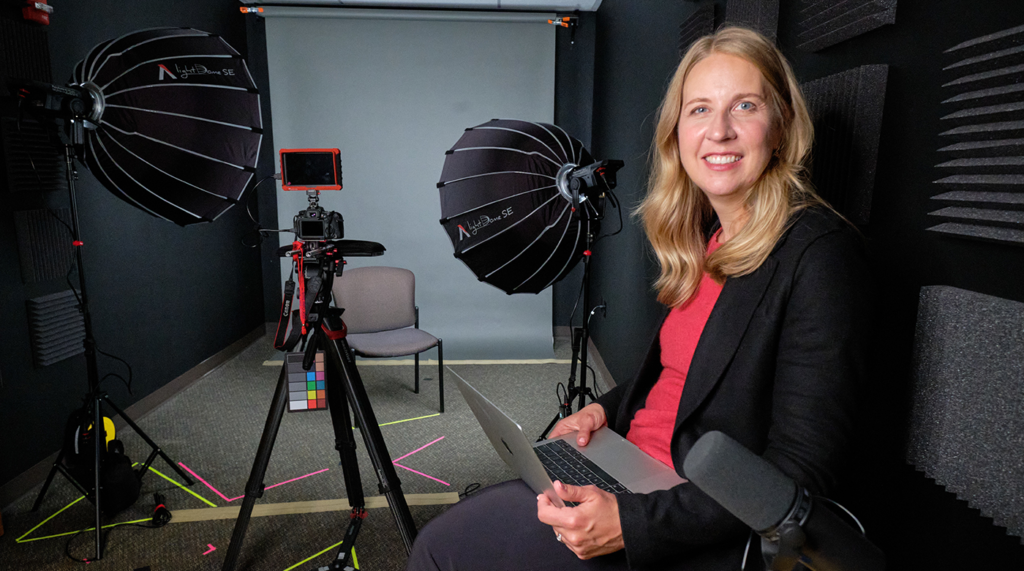Page 13 • (1,311 results in 0.094 seconds)
-

Kirsten deLohr Helland ’10 never considered being an actor during her early years at Pacific Lutheran University. Actually, she was thinking about being a psychology major as she mulled over her future in her sophomore year. That is, until Assistant Professor of Theatre Brian Desmond…
Alumna kicks up heels in Seattle production of “Oklahoma!” Posted by: Mandi LeCompte / February 21, 2012 Image: Kirsten deLohr Helland ’10 as Ado Annie in “Oklahoma!” (Photo courtesy of Fifth Avenue Theatre.) February 21, 2012 Kirsten deLohr Helland ’10 never considered being an actor during her early years at Pacific Lutheran University. Actually, she was thinking about being a psychology major as she mulled over her future in her sophomore year. That is, until Assistant Professor of Theatre
-

Embracing the ‘bigger questions’ and living with a true sense of joy CALLING ANY UNDERGRADUATE an expert in spirituality might be an overstatement. But in speaking with Timothy Siburg, it is abundantly clear that he has done some deep thinking about the nature of spirituality…
June 4, 2009 Embracing the ‘bigger questions’ and living with a true sense of joy CALLING ANY UNDERGRADUATE an expert in spirituality might be an overstatement. But in speaking with Timothy Siburg, it is abundantly clear that he has done some deep thinking about the nature of spirituality at PLU. And he has some serious credibility. What are the ‘bigger questions’ Timothy Siburg learned to ask at PLU? Last summer, he was one of only 50 undergraduates in the nation invited to attend the annual
-

Campus Safety responsible for keeping small city of 4,500 safe By Barbara Clements They will give you a ride home too. New students coming to Pacific Lutheran University this fall might be thinking about classes, their roommates, their majors or just how did mom say…
May 26, 2010 Campus Safety responsible for keeping small city of 4,500 safe By Barbara Clements They will give you a ride home too. New students coming to Pacific Lutheran University this fall might be thinking about classes, their roommates, their majors or just how did mom say to do the laundry again? Campus Safety Director Tony Berger and staff work 24-7 to keep the 4,500 students, faculty and staff on the PLU campus safe. Berger is standing by Jason Weaving, Operations Supervisor. But
-

It is not too late to decide where you will study away this January Tibet 2012, submitted by Evan Koepfler It may be summer, but it is never too late to start thinking about January Term 2014 – particularly, where you want to study away.…
June 12, 2013 It is not too late to decide where you will study away this January Tibet 2012, submitted by Evan Koepfler It may be summer, but it is never too late to start thinking about January Term 2014 – particularly, where you want to study away. The Wang Center for Global Education has extended its deadlines to make it easier to apply. Of the 25 dynamic faculty-led study-away programs offered this January, more than 15 international programs – including those in Antarctica and Argentina
-

Kristen (Vold) Jaudon ’94 likes to keep her options open. “I say ‘yes’ to different possibilities,” she says. “I like trying new things.” That kind of thinking helped her segue from jobs in art education and publishing to public education communications. As senior director for…
. “I say ‘yes’ to different possibilities,” she says. “I like trying new things.” That kind of thinking helped her segue from jobs in art education and publishing to public education communications.As senior director for communications, government relations and public engagement for Educational Service District 113, her team provides services such as writing, video production and graphic design for school districts in Grays Harbor, Lewis, Mason, Pacific and Thurston Counties. They also foster
-

Lisa Woods ’92 leads initiatives to help improve systems and services as the City of Tacoma’s chief equity officer. She says her approach to this work starts with listening and continuously thinking about how best to center community voices, experiences and needs. How can centering…
Centering the City: Lisa Woods ’92 discusses her work as Tacoma’s chief equity officer Posted by: Zach Powers / November 3, 2022 November 3, 2022 By Zach PowersResoLute EditorLisa Woods ’92 leads initiatives to help improve systems and services as the City of Tacoma’s chief equity officer. She says her approach to this work starts with listening and continuously thinking about how best to center community voices, experiences and needs.How can centering community voices help lead to more vibrant
-
Kirsten deLohr Helland ’10 never considered being an actor during her early years at Pacific Lutheran University. Actually, she was thinking about being a psychology major as she mulled over her future in her sophomore year. That is, until Assistant Professor of Theatre Brian Desmond…
Alumna kicks up heels in Seattle production of “Oklahoma!” Posted by: Mandi LeCompte / February 21, 2012 February 21, 2012 Kirsten deLohr Helland ’10 never considered being an actor during her early years at Pacific Lutheran University. Actually, she was thinking about being a psychology major as she mulled over her future in her sophomore year. That is, until Assistant Professor of Theatre Brian Desmond insisted that she try out for a part in “Cabaret.” She lobbed back excuses. Too much
-

Thinking about graduate study in history? Pacific Lutheran University history majors have an excellent track record when it comes to earning an M.A. or a Ph.D. (or both) in history. I recently touched base with Carli Snyder, ’17, about her first year in grad school.…
From PLU History to Grad School in the Big Apple! Posted by: shimkojm / August 20, 2018 Image: Carli studying at her desk before her final exam (loving it!) August 20, 2018 By Carli Snyder (2017 History graduate) and Beth Kraig (Chair of History at PLU)Thinking about graduate study in history? Pacific Lutheran University history majors have an excellent track record when it comes to earning an M.A. or a Ph.D. (or both) in history.I recently touched base with Carli Snyder, ’17, about her first
-

Human impact on the natural world is impossible to ignore. From severe flooding in Africa, melting of the arctic poles, and fires across Australia, recent years have seen a drastic increase in anomalistic climate events. In response to these problems, Pacific Lutheran University values “thinking…
Environmental Ethics at Holden Village Posted by: hoskinsk / May 6, 2020 May 6, 2020 By Lee Sullivan '21Business MajorHuman impact on the natural world is impossible to ignore. From severe flooding in Africa, melting of the arctic poles, and fires across Australia, recent years have seen a drastic increase in anomalistic climate events. In response to these problems, Pacific Lutheran University values “thinking green”. Our university takes pride in being environmentally conscious stewards of
-
The Pacific Lutheran University English department offers emphases in writing and literature, as well as minors in Children’s Literature and Culture and Publishing and Printing Arts.
What Can You Do With a PLU English Degree? … Almost Anything! Learn more about these recent PLU English alums -- And how their English degree prepared them for their exciting careers! Read More Study a Minor in Publishing and Printing Arts Program Details Study English at PLUWhether you choose a concentration in Writing or Literature, an English major will help you understand and practice the creative, critical, and persuasive uses of the written word. Writing and literature are powerful means
Professor Jim Albrecht, ChairHauge Administration Building Admin 207D 12180 Park Ave S Tacoma, WA 98447
Do you have any feedback for us? If so, feel free to use our Feedback Form.


